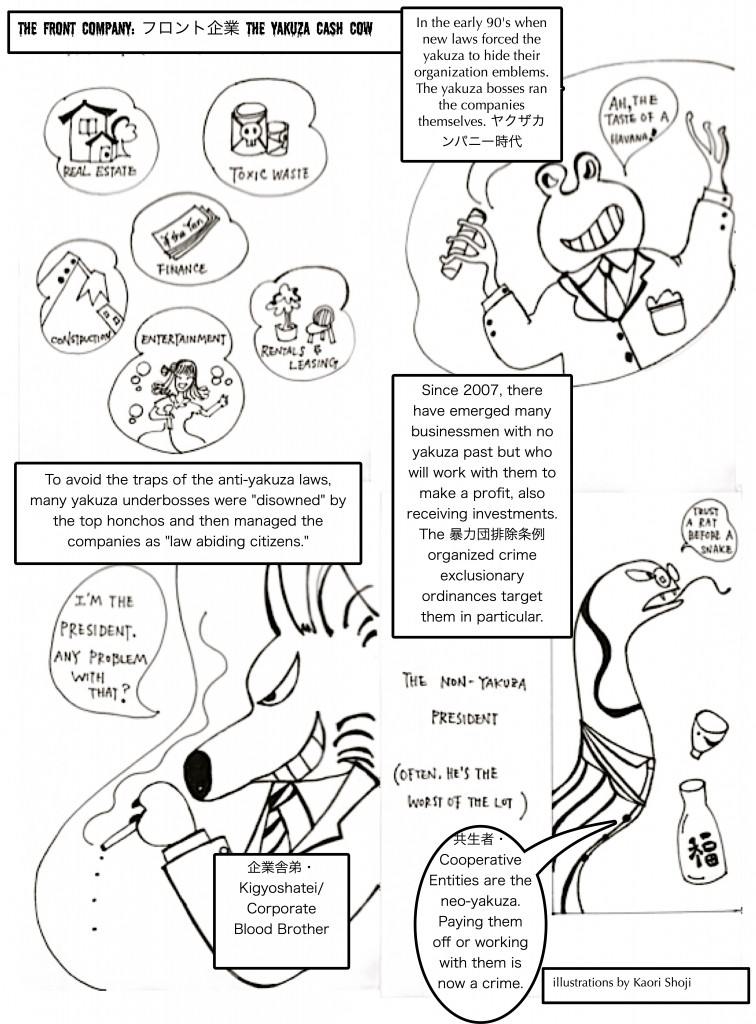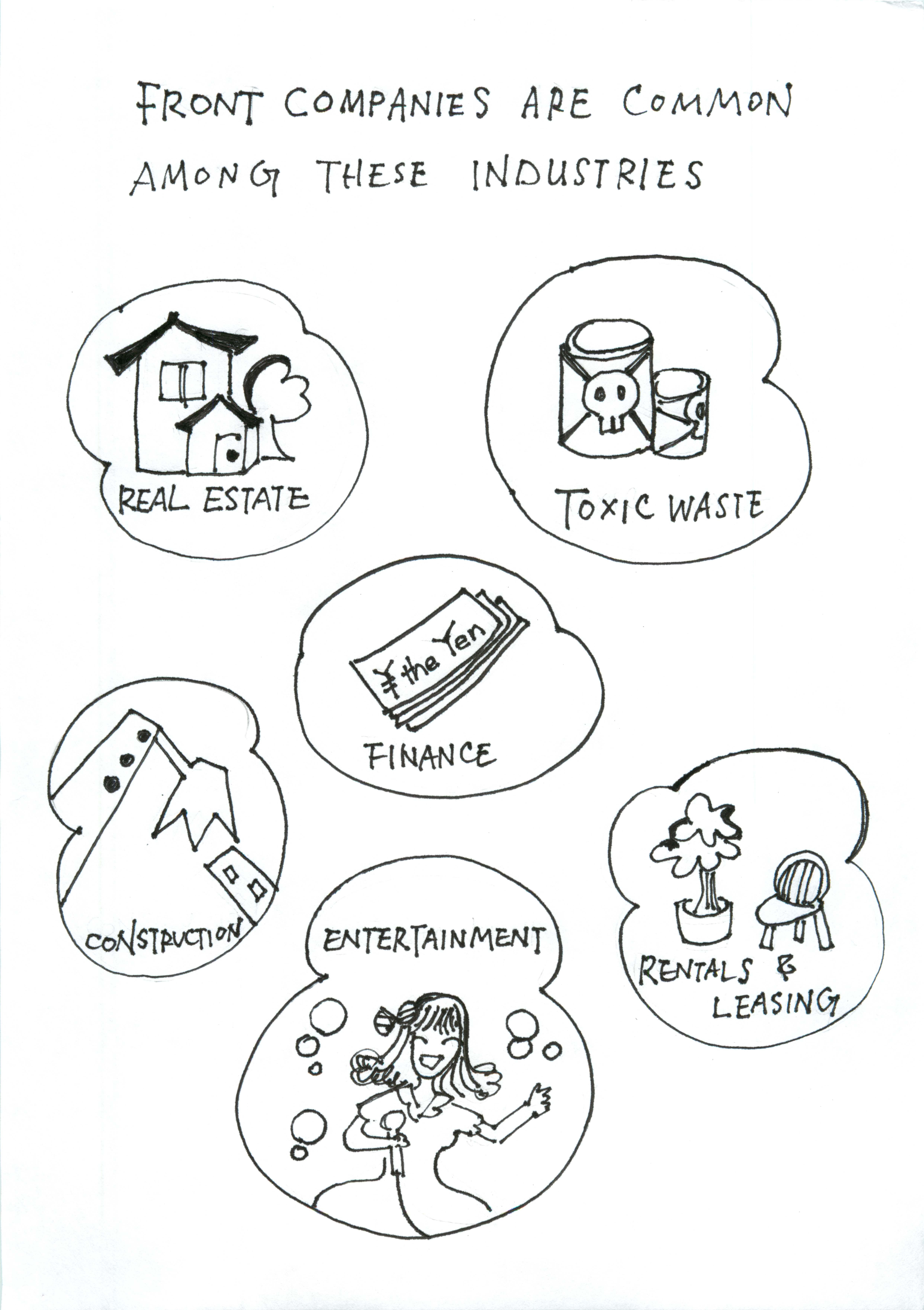Sometimes, a picture is worth a thousand words. Of course, if it’s a thousand words of bullshit–the picture isn’t actually that useful. Hopefully, this is worth at least 800 words.
Understanding organized crime in Japan isn’t always easy. It gets more and more difficult as time goes by and the yakuza move underground. The first anti-organized crime laws in Japan went on the books in 1992. (暴力団対策法). Yakuza groups could no longer openly display their group emblems or their names. So what they did is incorporate themselves, setting up companies or associations, creating what Takashi Arimori called “The Yakuza Company” aka “front companies.” As the anti-organized crime laws have gotten stricter, these front companies have evolved and the yakuza associated businesses have diversified.
Last year, in Tokyo and in Okinawa, organized crime exclusionary laws (暴力団排除条例-boryokudan haijojorei) went into effect, thus making all of Japan a lot less yakuza friendly; it’s the start of the Big Chill. The laws vary in the details, but they all criminalize sharing profits with the yakuza (aka Japanese mafia) or paying them off. The laws were designed to help crush the front companies and cooperative entities that increasingly bring in major revenue for organized crime.
In other words, if you pay protection money to the yakuza, or use them to facilitate your business affairs, you will be treated as a criminal. You may be warned once, your name released to the public, and fined or imprisoned, or all of the above, if you persist in doing business with the yakuza.
However, what is particularly vexing to the yakuza, is that any payments to the yakuza are criminalized. For example, if the yakuza are blackmailing you or extorting cash from you and you pay them off, you are no longer a victim–you are also a criminal under the new laws. Thus, for most people the benefits of throwing yen at the yakuza to keep them quiet start to fade. Blackmail/extortion is a huge money maker for the mob in Japan. Roughly 45% of all people arrested for the crime (恐喝/kyokatsu) in Japan are yakuza members (circa 2010). Hush money is big business but only when people will pay you to hush up. When they start going to the police as soon as you try to shake them down, the business model falls apart.
To give you an idea of the scale of organized crime front companies in Japan, in Tokyo alone, there were over 1,000 at the end of 2010. And those are simply the ones that the police were able to identify. If you include new venture companies that were bankrolled by the yakuza behind the scenes, the numbers go even higher. A noted economist once called the yakuza Japan’s second largest private equity group. It makes sense. Yakuza are gamblers and there is no greater gamble than betting on a new company or business model. Of course, if you own a number of auditing firms, securities companies, and have the capital to manipulate stock prices—it helps get the company off the ground successfully. Sometimes an organized crime group will raise up a company, pull back, and make sure they get a steady kickback. Most of the time when the yakuza bank roll a company, they nurture it until it’s successful, often breaking the law in the process–pump up the stock prices, sell at a profit—and then loot the company out of all its assets before it goes under and start all over again.
Goodwill Group. Ltd,, a temporary staffing agency/rest home manager, now delisted, is a prime example of what was once considered a great promising young company eaten alive by the yakuza. Whether the yakuza were on board from the beginning or not is unclear–but they were involved in feasting on the flesh of the corpse–that’s for certain. Suruga Corporation is another example of a yakuza front company that got its wings clipped. Recently, the Inoue Kogyo case showed how the Yamaguchi-gumi can profit from a cooperative entity. The police and the regulatory authorities have been clamping down on the nine-fingered economy increasingly since 2008, but the yakuza connections don’t always surface. For the authorities, if they can put the firms out of business–that’s enough.


Will the Yakuza also use a front company as collateral for debts owed to them? For example, in cases with the Cosa Nostra in America they sometimes perform what’s known as a ‘Bust-Out’: a businessman who owes them money will be forced to make the Cosa Nostra partners in their company.
Once in, the gangsters then run up huge bills on the store’s credit lines and sell whatever goods they receive at knock-down prices on the streets. Once the creditors start raising red flags, the gangsters then loot the company of all its assets and leave the poor buisnessman to answer the courts alone.
this is so clearly a failure of the japanese police. they can’t nail nail the extortionists, so they nail the victims. keystone cops. the only thing that this will do is create further opportunities for corrupt cops. that and drive gangsters underground. Ando bakaharu can have his wish, the yakuza will disappear from public society, his successors can then reap the benefits of his policy just like italy is right now: policing turns into an exercise in whacking moles
If you drive them underground, then new gangs will come up. Look at Chicago or New York. Once the italian mafia went out of business, MS13, Crips, bloods, ESL, le locos, etc came into power
Gangs will always be around because it attracts money and power. who wouldn’t want fast money and power?
Are you guys really surprised or something? This is how the Mafia used to do it back in the old days. You launder all the illegal cash to “legitimate” businesses. nothing new
Chicago is a little different. Being the national transportation hub (rail, air, and trucking), what I’ve was relatively small money stuff (Capone, Dillinger) is now an international business fueled mainly by Mexican and Central American narcotraficantes. The war on drugs is a farce. Stop people from buying Sudafed to make meth, the narcotraficantes will ship it up by the truck load, parcel it out into smaller quantities for distribution in the Midwest, Mountain, and parts of the Eastern states for distribution by various gangs likebthe MLDs and others. There are plenty of cash businesses to launder the money through, and plenty of places to wire money back home to Mexico, etc. Our policies are more like the keystone kops, spread out over a much wider area.